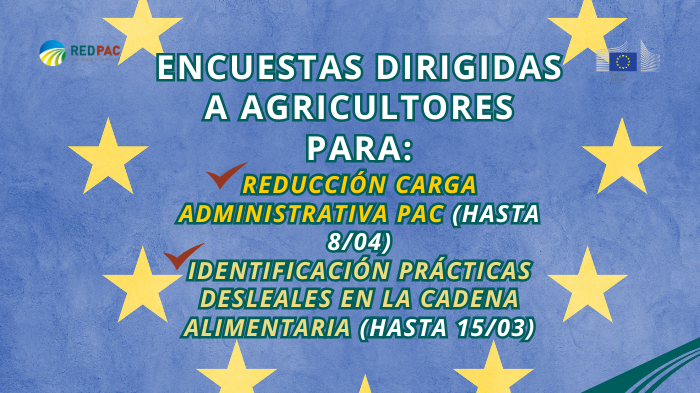
08 de March de 2024
Dinamización rural
Cambio climático y gestión de recursos naturales
The surveys - available until March 15 and April 8, respectively - are aimed at farmers, ranchers and all suppliers in the food supply chain to gather their experiences with unfair trading practices, as well as to identify the administrative burdens of the CAP.
- Last February, the European Agriculture Council discussed reducing the administrative burden in the management of the CAP, as well as the implementation of measures against unfair trading practices in the food chain.
- The European Commission now has a document on administrative simplification of the new CAP, which it intends to expand with the sector's initiatives included in the survey launched until April 8.
On 22 February 2024, the European Commission sent a document to the Belgian Presidency outlining possible actions to help reduce the administrative burden on farmers. The document, discussed with Member States at the Agriculture Council on 26 February , lists a number of short- and medium-term actions that can be taken to achieve simplification.
The Council highlighted the importance of identifying the main elements derived from the Common Agricultural Policy (CAP) regulations that generate the greatest administrative burden. Therefore, the European Commission has launched a survey targeting the agricultural sector to identify the bureaucratic management that concerns and preoccupies farmers and ranchers. This survey will be available until April 8 , in all European Union (EU) languages. The survey results will be published as part of a detailed analysis in autumn 2024.
In turn, another survey has been launched, targeting not only farmers but also all suppliers in the food supply chain to share their views on their experience with unfair trading practices . This survey is also available virtually in all EU languages until 15 March 2024 .
Simplification options
The current CAP, based on CAP Strategic Plans decided at the national level, already represents a step forward in terms of simplification compared to the previous period. Member States play a key role in keeping the administrative burden on farmers low.
In addition, the Commission has proposed short- and medium-term simplification measures to reduce red tape for both farmers and national administrations:
1) Simplification of some of the cross-compliance requirements that EU farmers must meet :
Regarding the set of basic standards—known as “GAC” (Good Agricultural and Environmental Conditions)—that all farmers must meet to receive CAP support:
- The Commission has proposed a partial exemption from the fallow land rules (the so-called BCAM 8) for 2024.
- Amendment to BCAM 1, which imposes a requirement to maintain stable permanent grassland areas in the EU since 2018. The Commission proposes amending this rule to take into account the structural changes caused by market reorientation and livestock reduction, ensuring that farmers are not penalized, as fewer areas would have to be converted to permanent grassland.
- Review of the type of agricultural practices to be cultivated during sensitive periods to cover soils within the framework of BCAM 6.
- Review of the administrative burden regarding nitrates.
2) Simplification of controls , in order to reduce the number of visits to farms by up to 50% by national administrations :
This measure responds directly to Member States' requests. The EC proposes establishing a system based on the automated analysis of satellite images called "Copernicus," designed to reduce farm inspections.
3) Clarification of the use of the concept of force majeure and exceptional circumstances :
This legal concept allows farmers who are unable to meet CAP requirements due to extraordinary circumstances (severe droughts, floods, etc.) to avoid penalties. This clarification will make it easier to obtain CAP assistance in the event of a disaster.
4) Additional medium-term measures :
- Exempt small farms of less than 10 hectares from compliance with cross-compliance requirements (BCAM), which represent 65% of CAP beneficiaries, but only 9.6% of areas receiving CAP support.
- Facilitate the exchange of good practices in simplification by Member States among the groups involved.
Food supply chain
To strengthen farmers' position in the food supply chain, the Commission will present Member States with measures to enhance market transparency in the food supply chain this March:
- Stricter enforcement of the Unfair Commercial Practices Directive (UCP), which has been in place since 2019 .
- More homogeneous control of existing standards on imported agricultural products.
The Unfair Commercial Practices Directive (UCP) includes a ban on frequently occurring unfair commercial practices:
- Late payments for perishable and non-perishable food products.
- Last-minute order cancellations.
- Unilateral or retroactive changes to contracts.
- Force the supplier to pay for wasted products and reject written contracts.
It also allows farmers to speak safely and confidentially and allows authorities to initiate sector-specific investigations to identify and punish unfair trading practices.









